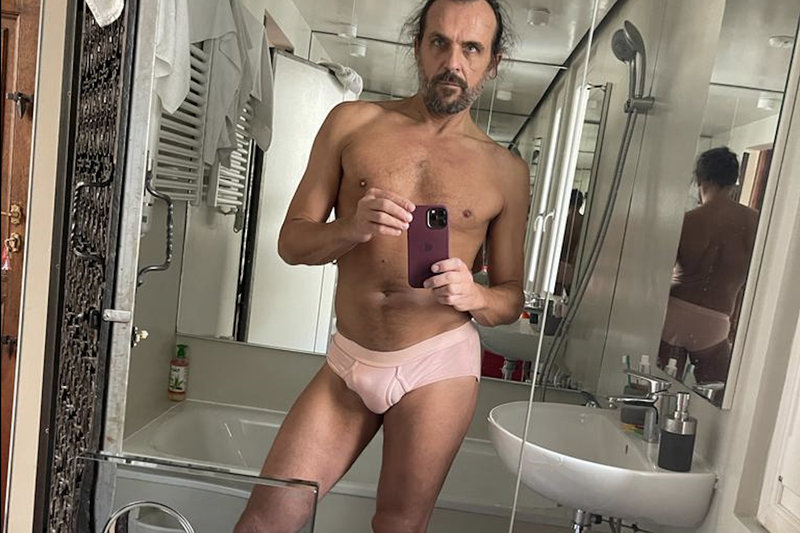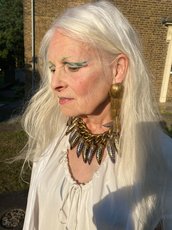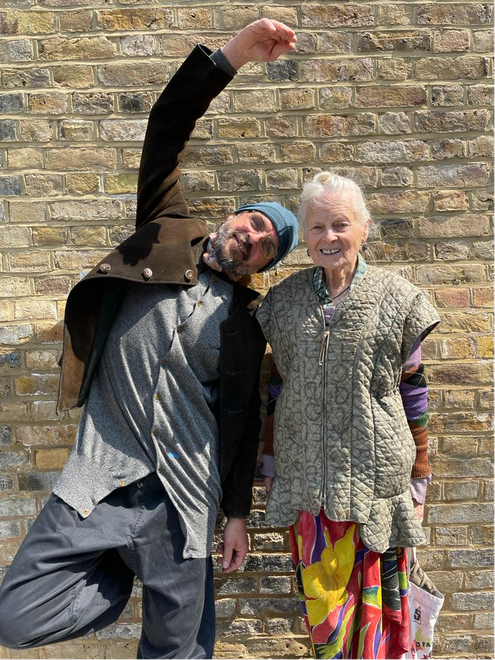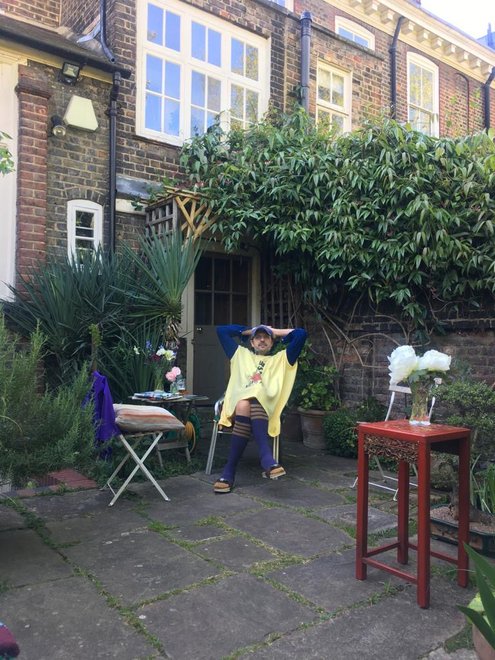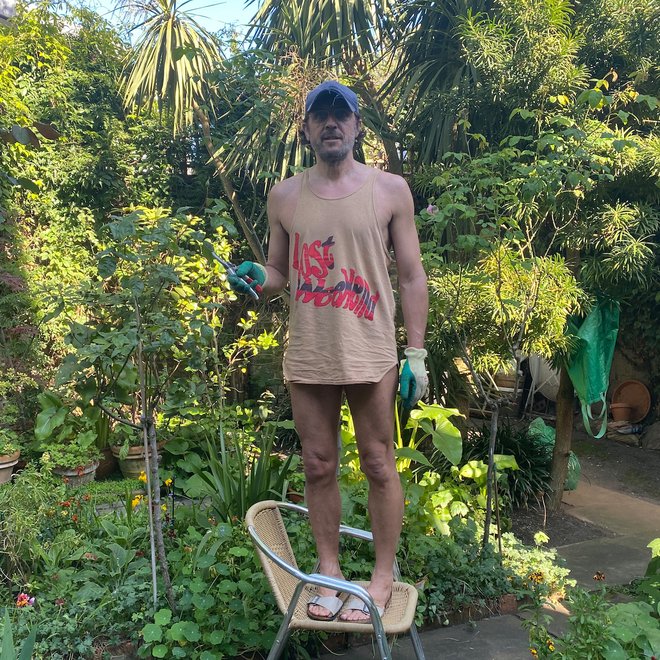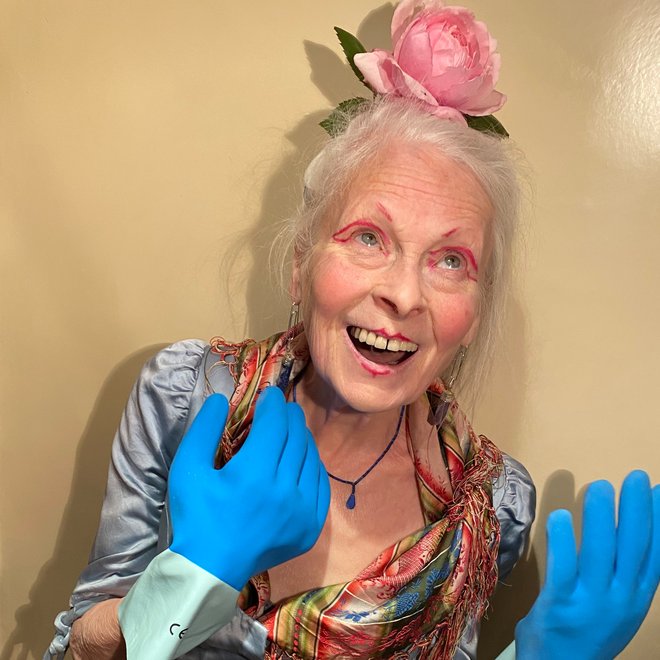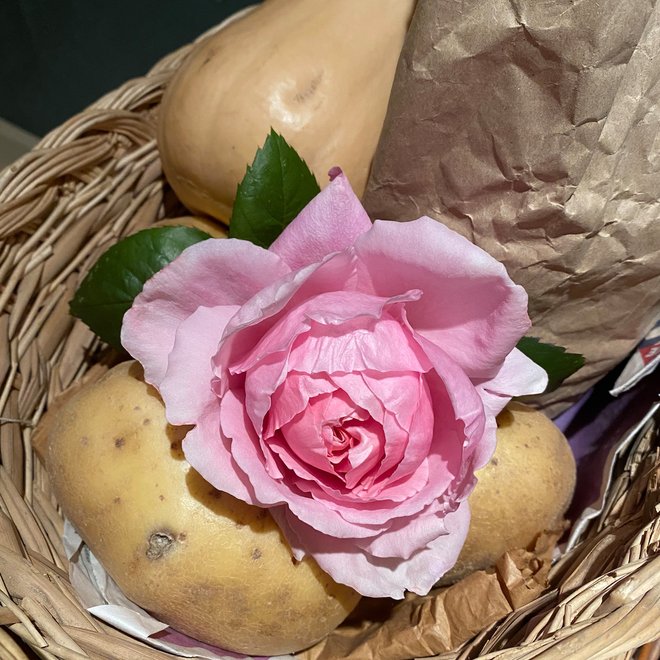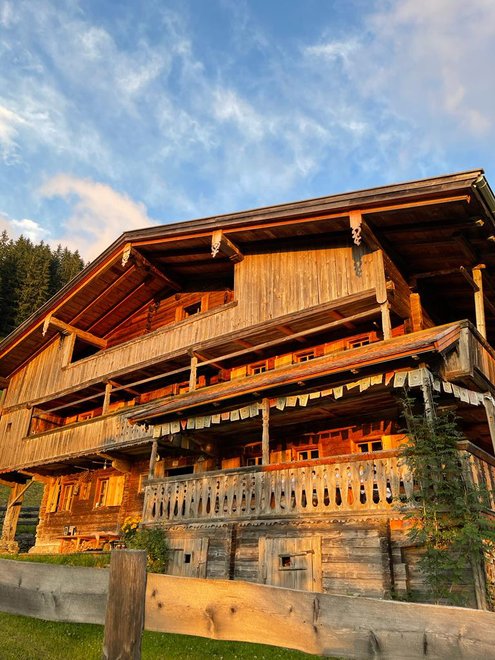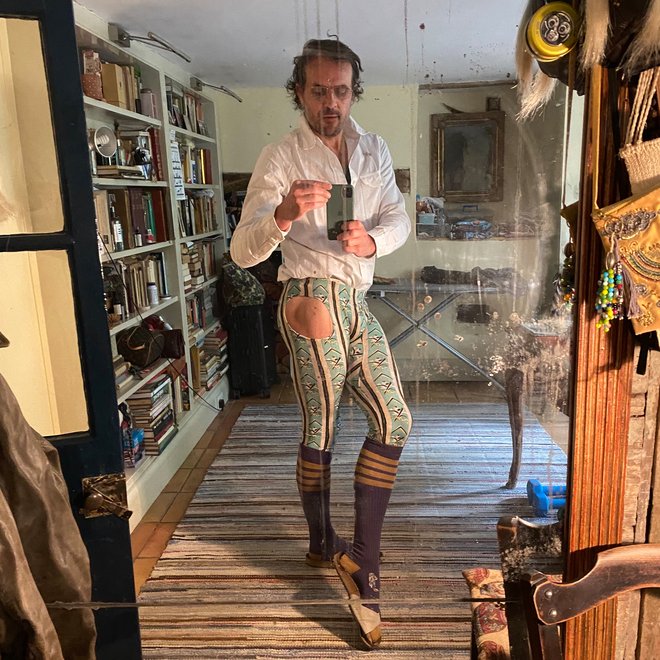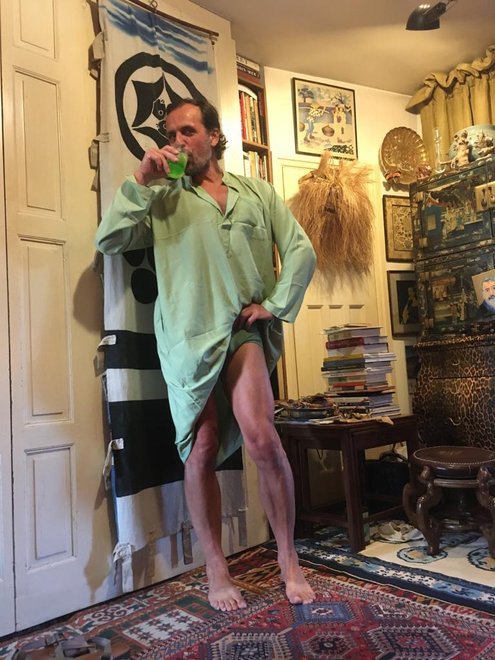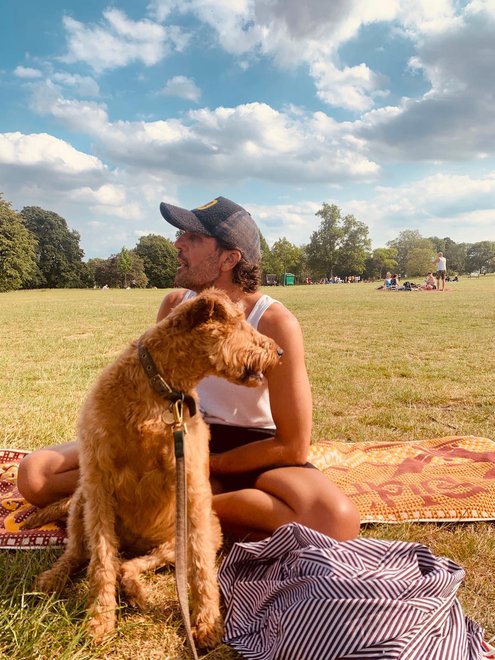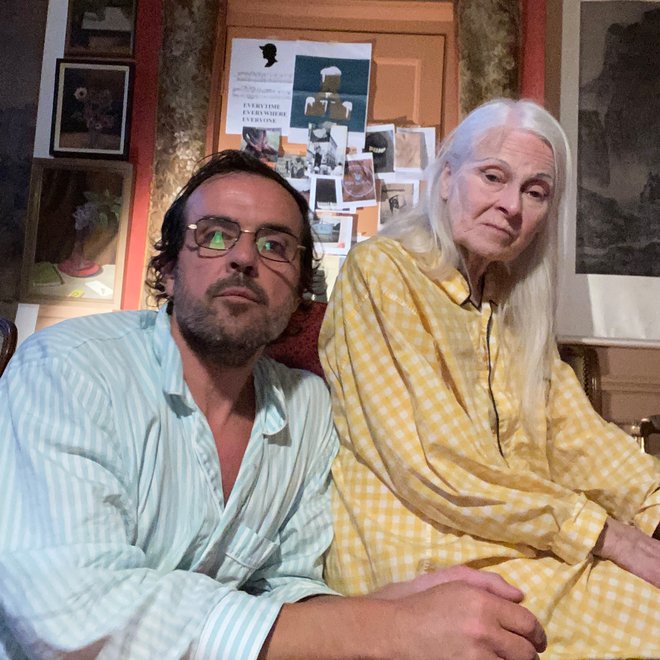Where are you from?
The roots of fashion designer Andreas Kronthaler, husband of Vivienne Westwood, are in the Tyrolean Zillertal valley. We could have asked him what it was like to have tea with Prince Charles. But we didn’t. Instead, we had a chat about his grandmother’s blueberry patties and the fur coats of his old aunt in Graz. This interview was written in the summer of 2022; Vivienne Westwood has since passed away. We have not changed it and have left it as it was held. We send our heartfelt condolences to the Westwood and Kronthaler family.
„She likes my shoulders cause she often leans on them.“
Antje Mayer-Salvi: I’m reaching you in London – you grew up in Tyrol?
Andreas Kronthaler: I recently acquired British citizenship. That was quite a procedure! You have to pass tests, they ask you about the history of the country, and so on. Actually, it was all quite funny, and there was even a chipper welcome ceremony at the end
I can still hear a bit of your Tyrolean dialect. Isn’t there the saying: once a Tyrolean, always a Tyrolean?
So where are you from? (laughs) Yes, I’m Tyrolean, and Austrian only in second place. Both are in the heart. For me, Britishness stands for spirit and creativity, for the incredible opportunities this country offers me, for an openness to new things, and for this great interconnectedness with the whole world, which ultimately stems back to the British Empire.
How did you make it from a village of 3000 souls in the Zillertal to the big wide glamorous world of art and fashion? Tell us about your childhood!
My mother was an antique dealer, my father a gifted ornamental blacksmith. He ran a workshop with over a dozen employees at our house. I often went down to watch him work. My father was a highly respected craftsman. His customers came to us in the Zillertal from all over Tyrol and even Bavaria. There was an insanely long waiting list for his things. Some people even had to wait several years. A grave cross by him was something very special, you really had to be somebody.
„You really had to be somebody.“
Did you inherit your artistic talent from your father?
49 percent from my mother and 51 percent from my father. (laughs) To speak of yourself as talented is not my thing. My father was a great guy and a very jovial person, and in a way, sure enough, an artist too. Only after he died, a few years ago, did I realize how much he had influenced me and my work. Art and later goldsmithing was a kind of bridge to fashion for me. It relates to the body, like fashion.
Was fashion your plan all along?
Always, I always wanted to do fashion. In our attic, the closets were full of clothes, accessories, and textiles from my grandmother and mother, which we children used to put on fashion shows and stage plays, especially in summer. We even pinned up posters in the village, and my parents’ friends would come to our show on Saturday afternoons. They had to pay admission, of course. We even had our own cashier and tickets. From the proceeds, we always went out for ice cream. That was great!
Your grandmother and mother still carefully tended to their clothes, today everything ends up in a container – the fashion industry, which you’re part of, has completely lost its bearings, hasn’t it?
This consumer madness with umpteen collections a year has long since passed its zenith. Sustainability has been a big issue at Vivienne Westwood, already for a long, long time. The label has initiated and tried all sorts of things in this direction. Everything’s been said and done. However, I’m slowly starting to look at the topic differently, more holistically.
„I have mad fun with the process.“
You mean, the issue of sustainability cannot be solved just on a technical level? Loosely in the words of Heidegger: “It has to be holy.”
Yes, well, that sounds beautiful! It’s about a different kind of awareness, the joy of wearing a piece of clothing, and the aura of fashion. A bit like with food. Some of what we drink and eat may not be one hundred percent healthy, but it makes us happier and perhaps helps us to make the world a bit better, too. It’s about how you view the thing and the garment, how you celebrate it, how you enjoy it, and how you bring it into the world. The traditional definitions of sustainable, unsustainable, unhealthy, healthy don’t add up for me anymore.
What gets you creative? What inspires you?
I listen to Gustav Mahler, Richard Strauss, and Richard Wagner. I love Wagner! Vivienne and I go to a lot of concerts in London. She adopted my passion for classical music. I’m inspired by something on the street, on the radio, a photograph, I cut off a piece of material somewhere, or I draw, I can’t name one specific source. I collect all kinds of things. I have incredible fun in the process, I’m more interested in the journey than the destination. I try out a lot, even if I often come to a dead end. Chance is the best architect. You just have to open yourself to it. That is the secret.
You have to trust art ...
... and in the end your own judgment. I can have a bit of Tyrolean stubbornness. How often have we held on to something, not let ourselves go astray, until it was finally recognized as good – skirts for men, for example.
„My grandmothers cooked like goddesses.“
How does your stubbornness jibe with Vivienne Westwood’s character?
Sometimes it comes to duels. But very rarely. Vivienne and I work in such opposite ways. She approaches things very differently; she takes one thing and builds it up. I take the whole lot and break it down piece by piece. Unfortunately, my method is often quite laborious and time-consuming.
You are more like a sculptor, she a potter. Do your origins influence your fashion?
When I was young, I didn’t care about my roots at all. The older I get, the more I come to terms with them, in a playful and humorous way. For me, it’s not so much the clothes or the costume there that I remember, but rather the approach to food, which inspires my work. I come from a home where food was very important. My grandmothers cooked like goddesses. When I was a boy, I regularly spent a few weeks in the summer with my grandmother on an Alpine pasture. She owned an inn and, man, she could cook! When the blueberries were ripe, I combed the slopes to pick them with the rake. Then she made blueberry patties for me – they were so fluffy, delicious! I had a blue mouth and blue teeth afterwards.
"People were not that small-minded in my valley."
Are food and fashion birds of a feather?
Of course. This incredible effort invested for a good meal in my childhood days! How precisely my mother cut the potatoes! This reverence and sensuality, almost erotic relationship with food. What else is the function of food, clothing, and fashion? That you get full and don’t get cold – but in the end, it’s about indulgence, about getting to know each other, about appeal, about sex, eroticism, and sensuality.
Did you dress extravagantly when you were young?
Always. Nobody in the village cared. In the Zillertal, people weren’t as small-minded as one might think, perhaps it’s because of all the tourists.
At the age of 14, you went to an arts and crafts boarding school in Graz, graduated with a high school diploma, and afterwards trained there to become a goldsmith.
A great religion teacher in Tyrol told me about this school. This step was the first big change in my life and broadened my horizons. There I could try out all sorts of artistic practices: ceramics, goldsmithing, painting, and so on. And an old aunt of mine lived in Graz – she has unfortunately passed away – whose wardrobe I modified.
„I went at my aunt's fur coats in kamikaze style“
For money?
Yeah, sure, I lived on that for years. I went at her fur coats kamikaze style. I could design whatever I liked for her.
Your aunt wore your first designs? How brave!
My aunt found them great; they were really wild creations but never good enough for my mother. In Tyrol, people used to have most of their wardrobe custom-made by a seamstress. On Saturday afternoons, my mother would go to fittings. One seamstress was specialized in everyday clothes, another in festive costumes. For jackets and sweaters, there was even a knitter. The fabrics were usually purchased in town, and an incredible amount of time was spent on clothing.
Do you wear traditional costume?
My mother often wore dirndls. Traditional costume can be chic; it depends on who’s wearing it and why. I like black leather pants with a T-shirt on me.
What does Vivienne think of the Tyrolean mountains?
Vivienne herself grew up on the countryside in northern England, her father was a dog breeder. She meets everyone in Tyrol with incredible interest. She has an amazing connection to animals and nature. My family – my brother is a mountain farmer – really appreciates that about her. For decades now, we’ve been going to the mountains in Austria, where I restored my grandmother’s old farm house from the 15th century. If I had known what a grind it would be, I might not have done it. Now all that’s missing is the baroque chapel.
"Vivienne has an insanely close relationship with animals and nature."
Does she like your Tyrolean way?
I think she likes my shoulders cause she often leans on them. (laughs) She says she’s inspired by how I look at things. And I can only return that. She has such vast knowledge, she can sing thousands of songs by heart, recite countless poems and pages and pages of Shakespeare. Quite the opposite of me!
What matters in life?
Love! And I think everyone has a right to time and freedom to do what they want to. Life should be a joy. And above all, easy to live!

